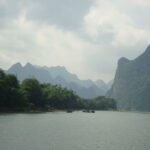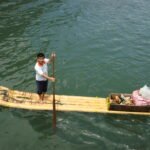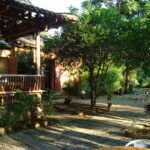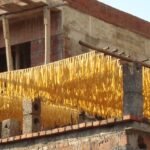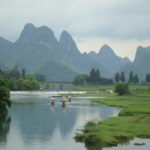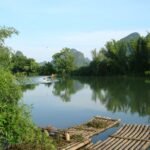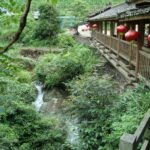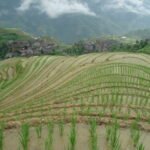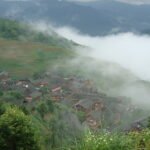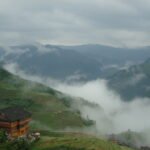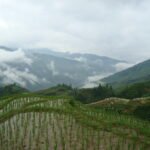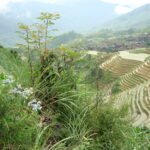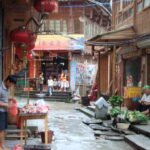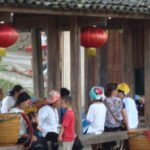Two Backpacks
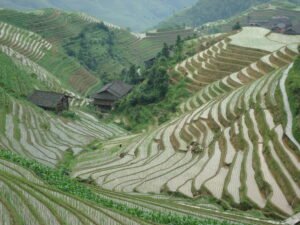
Chapter 11 - Dragons karsts and tranquil beauty - Guilin Yangshao and Ping'an
Our crossing back into China from Hong Kong is uneventful, as is our flight from Shenzhen to Guilin, some six-hundred miles northwest of Hong Kong. Our plans include a river trip to Yangshuo and a visit to the rice terraces at Ping’An. We talk to a young English couple during the flight, exchange travel information and agree to share a taxi from the airport.
Even at nine o’clock at night, a line of taxis is waiting outside Guilin’s arrival hall. The four of us wait patiently in line, something the Chinese seem unable to do! Our companions show our taxi driver details of their hostel, and we set off to the city centre, east of the airport. We’re all tired, and conversation is sparse during the fifteen minutes ride.
‘Maybe we’ll see you on the riverboat trip,’ I offer as our companions exit the taxi, pay their portion of the fare and retrieve their bags.
‘You never know. But I think we’re planning to stay longer than you guys. Stay safe. Travel happy,’ replies the young woman.
‘Hope our hostel is as nice as theirs,’ Ron states as we show our driver the details of our accommodation.
While waiting for our flight from Shenzhen, a young Chinese woman had started a conversation with me, wanting to practise her English. In exchange, I’d asked her to translate the name and address of our hostel in Guilin into Mandarin.
I know the hostel is located on the outskirts of the city. I’d chosen it for that very reason, a chance for peace and quiet after the hullabaloo of Hong Kong.
But, as the minutes tick by and we leave the city, I feel uneasy. I’ve no idea where we are or where we’re going! No well-lit roads now; only the car’s headlights illuminate the road.
‘Do you think he knows where to go?’ I whisper to Ron, becoming more concerned the longer the journey takes. ‘It feels like we’re going around in circles!’
‘I know. I’m worried too. We seem to be miles from the city centre,’ Ron replies. ‘Didn’t you say the hostel was on the city’s outskirts?’
Unable to converse with our driver in Mandarin, I tap him on the shoulder, hold out the hostel’s details again, and follow up with a thumbs-up sign and shrug. He glances at me as if I’m a loon before returning his attention to the dark, unlit road ahead.
Thoughts fly through my head. We’ve no idea where we are. Do we trust the driver? Should I tell him to take us back to the city where we can find a hotel for the night? I’m worried and, if honest, a bit scared, but I know Ron can take care of himself and me if need be.
After what seems like an hour but is probably only about forty minutes, our driver pulls to a halt outside a house on a narrow, tree-lined road. A street lamp a few yards away provides a dim light, illuminating curtained windows and a heavy front door – if this is our hostel, it looks deserted.
‘Is this it?’ Worried we might be in danger, I hesitate, my hand on the car door’s handle. ‘Do you think it’s safe?’ I ask, turning to Ron.
‘Don’t take the bags from the boot. Stay in the taxi while I go and knock on the door,’ instructs Ron. ‘If it’s not the place, we don’t want the taxi to drive away!’
The taxi driver is becoming impatient. I do as Ron asks and watch as he knocks at the front door. No-one answers. He knocks again, this time a little harder. Unwilling to budge until we know whether we have a bed for the night, I watch as Ron knocks a third time.
A light goes on somewhere in the house. A few seconds later, the front door opens and reveals a slightly dishevelled young woman dressed in jeans and a bright yellow T-shirt.
‘Is this the Dozycat Hostel?’ queries Ron.
The young woman, thankfully, speaks English and confirms we’re at the right place. We retrieve our bags, pay the taxi driver and enter the building. The lounge area is spacious with two sofas, three armchairs, and four tables and chairs off to one side set for breakfast. A clock on the wall shows its nearly eleven o’clock.
‘It looks reasonably clean,’ I whisper to Ron while our hostess enters our passport details into a large, dog-eared ledger, open on a desk in the entrance hall.
Our sighs of relief are audible when she asks us to follow her to our room, a cabin at the back of the house.
The cabin is small and has a musty smell. I try to open the window, but its rusty hinges refuse to budge. The toilet/shower room is so tiny my knees protrude through the doorway when I sit on the toilet! But we do have an overhead fan! Turning it on, it creaks and groans in annoyance before slowly picking up speed, giving some relief from the humidity in our hot, muggy room.
‘I know! Don’t say anything!’ I snap, knowing Ron’s about to have a go at me for booking such an awful place. ‘We’ve got to stay here tonight. It’s too late to find anywhere else! Plus, we’ve no idea where we are!’ I state, wishing I’d been guided more by the hostel’s name when I decided to book for three nights – dozy meaning stupid or silly where I’m from in England.
Ron looks dubiously at the small double bed that occupies most of the room’s floor space. He pulls back the sheet, looks at the bed and then at me.
‘I think we’d be safer sleeping in our silk sleeping sacks tonight. Not sure that I trust the hygiene in this place.’
We both take a quick shower and then crawl, exhausted, into our lightweight sleeping bags.
‘I don’t think I’m going to get much sleep tonight,’ I mutter as I reach out and turn off the light. ‘Do you think there are bugs in the mattress?’
There’s no reply. Ron’s breathing has shallowed. Annoyed, I listen to the noises around us. Something is rustling about in the undergrowth outside. Did Ron lock the door before I turned off the light? I know I won’t sleep until I check. I slip from the bed, hug my sleeping bag around me and hop the few feet to the bedroom door and try the handle. It’s locked. Relieved, I bounce back to the bed and slide alongside Ron like some giant larva. He’s not moved; he’s out for the count.
I must have fallen asleep at some point in the night. I wake to find sunlight doing a limbo dance beneath the bedroom door.
‘Morning, love. Thought you’d never wake up.’ Ron’s rested and happy. ‘How did you sleep?’
‘I didn’t! Too many strange noises. I’m sure I felt bugs wriggling around in the mattress!’
‘Well, we can look for somewhere else to stay for the next few nights. Come on, let’s see what’s for breakfast. Then find out exactly where we are!’
Having rubbished the hostel the previous night, I must admit the breakfast is good, with eggs, ham, cheese, bread and coffee on offer. Our friendly night receptionist is on duty again. We enquire about sightseeing tours.
‘Will you be staying for the full three nights?’ she asks, looking shocked. ‘Most guests only stay for one night.’
Her statement comes as no surprise. Last night, tired from a full day of travelling, I’d been ready to leave as soon as possible. Now, rested and after a good breakfast, Ron and I decide the place isn’t so bad after all. Although our room isn’t great, we’ve managed to pry open the window, the fresh air eliminating the musty smell. We decide to stay one more night and take the river cruise from Guilin to Yangshuo the following day.
After a slightly more restful second night, we’re up early. It’s a beautiful, sunny day with only a few white cotton clouds scudding across the sky.
Our taxi drops us at the river jetty. I show our tickets to one of the many people touting the boat trips. A helpful young man points us towards one of the waiting boats.
‘I’m glad we bought the tickets from the hostel. I just heard one of those men offering tickets at twice the price we paid!’ Ron, a true Scot, is constantly watching the pennies. The fact he’s paid a bargain price for our tickets has made his day!
It’s June, and there’s very little water in the River Li. Onboard, we stow our bags and go onto the top deck, hoping the views will be better from a higher vantage point. Fifteen minutes later, the boat’s crew release the hawsers, and with a shout from the captain, the vessel gently pulls away from the shore.
At first, I find the scenery disappointing – I’d expected to see mountains and valleys from the outset of our voyage. But, as we sail serenely towards Yangshuo, the twists and turns of the river finally bring the famous limestone karsts into view. Greyish white, their pointed peaks and pitted slopes remind me of dragons’ teeth. I’ve no idea why!
‘They’re about to start serving lunch,’ announces the husband of a couple from Derby, England, a little later. Together with ten other Brits, they are on a tour of China.
We follow them down to the lower deck and take our seats at a table for six; our other companions a friendly, middle-aged Chinese couple. It’s difficult to determine how many passengers are on the boat, but Ron reckons there are at least sixty.
Once everyone’s seated, servers bring hot dishes to the tables, a mix of chicken, vegetables and noodles.
‘This is harder than it looks!’ exclaims the man from Derby as he jiggles a few green beans from the serving dish to his plate with his chopsticks.
I glance over at Ron and smile; he too is making a valiant attempt at transferring vegetables onto his plate.
Servers replace the empty dishes twice more, ending the feast with a dessert. By the time lunch is finished, it isn’t easy to move!
‘Let’s go back on deck,’ suggests Ron ten minutes later. ‘I want to get some more pictures.’
On the upper deck, we notice the river is even shallower, a mere trickle of its former self.
‘At this rate, we’ll all have to get out and push!’ exclaims another English passenger behind me.
Everyone laughs, but it may well be that we have to abandon our excursion and travel the remainder of the way by road.
No one has to abandon ship, and once through a particularly challenging section, the engine’s revs change, and we begin to pick up speed again.
‘Look at the fishermen!’ I exclaim as we pass long, narrow, hollowed-out canoes with cormorants sitting casually on the gunwales, long pieces of lightweight twine tied around their necks.
Seconds later, a bird dives beak-first from the canoe into the water, reappearing a few seconds later with a fish firmly clamped in its beak. The fisherman quickly grabs the bird and squeezes its neck to prevent it from swallowing its catch. The bird obligingly regurgitates the fish out onto the canoe’s deck.
‘Did you see that, Ron? The birds are doing the fishermen’s job for them!’
As the four-hour voyage nears its end, we find other boats vying for the opportunity to be the first to disembark their passengers at Yangshuo’s dockside. There’s much revving of engines and manoeuvring of boats as each captain tries to gain an advantage.
After a thirty-minute wait, our boat pulls alongside the dock. On terra firma, Ron and I shoulder our packs and walk the short distance into town.
We’ve got reservations at the Outside Inn, located in the village of Chao Long. An earlier email from the owner instructed us to take a taxi, but even though there are several taxis around, it’s impossible to find a driver willing to take us to the village.
In desperation, we walk into one of the swanky hotels and ask the concierge to call a taxi. It proves expensive (about fifteen pounds), but it’s worth the cost to get to the hostel without further hassle.
As the taxi approaches our destination via a dirt track, I feel the tension begin to drain from my shoulders. The hostel is a converted farmhouse set amongst green fields and woodland. It’s perfect for a few days of relaxation.
The hostel owners, a young European family, have converted the farm’s outbuildings into dormitories and en suite rooms. Our room, located on the first floor of one of the restored buildings, is spacious, with floor-to-ceiling windows that look out over the tranquil countryside.
We spend the next two days relaxing in the courtyard and taking walks along the Yulong River, a small tributary of the River Li, to the Dragon bridge about a mile away. But by the end of our second day, I’m beginning to feel fidgety again. I want to explore!
Before leaving Australia, I’d read about the ancient rice terraces of Ping’an. Over six hundred and fifty years old, the Zhuang people still cultivate the terraces today.
‘Do you fancy a trip to the rice terraces?’ I ask Ron the following morning, knowing full well what his response will be.
He looks up from whatever it is he’s doing on his computer. I can tell by the hesitancy of his reply that he’s not keen.
‘I suppose so. Where are they? Have we got enough time?’ he asks with little enthusiasm.
Our time in China is nearing an end. We only have a few more days before our visas expire, and we must leave.
‘Look. If you don’t want to come, that’s fine. The Kiwis we talked to last night have hired a taxi to take them. There’s a spare seat. I’ll go on my own.’
With my mind made up and happy to have a couple of days to myself, I take the offer of the shared ride.
We set off early the following morning. The two-hour journey takes us north through the misty, mountainous Guilin countryside. Our driver drops us off at the entrance to Ping’an, and the terraces as no vehicles are allowed beyond that point. To access the path to the village, visitors have to pay an entrance fee and then cross a wooden, roofed bridge that spans a river below.
The bridge is busy with locals and tourists crossing from one side to the other. Red paper lanterns tied to the rafters dance a welcome in the light breeze. I pay my dues and bid farewell to the Kiwis. Unlike my travel companions, who have booked accommodation in advance, I still have to find a bed for the night.
I pause for a few minutes to get my bearings. A cobbled stone path winds upward towards traditional wooden houses perched on the hillside. The smell of pine lingers in the air, a feeling of peace pervades my senses.
Slinging my bag over my shoulder, I begin the walk to the village above. The streets of Ping’an are narrow and twist and turn their way along the hillside’s contours. On the main street, shop vendors call out their wares while women stand and gossip, keeping a watchful eye on their offspring at play.
A hotel with a ‘Vacancies’ sign in the window looks inviting. I push open the glass-paned door and walk to the small reception desk where, through mime and the little Mandarin I remember from my two years living in the northeast of China, I ask for the price of a room for the night. The middle-aged man smiles and scribbles a price in Yuan on a scrap of paper. It’s the equivalent of two pounds. I nod my agreement, and he shows me to the first-floor bedroom.
The room is comfortable, the bed clean with crisp white sheets and two large, thick blankets on top of the bed. I unpack my few belongings and, needing to stretch my legs, decide to walk to the terraces.
I quickly realise just how out of condition I am! The paths through the rice terraces take me higher with every twist and turn. After an hour of climbing and two or three stops to catch my breath and recover from the humidity, I reach the lookout point with views of the Seven Stars under the Moon rice terraces, majestic in their simplicity. New, green rice shoots peek through grey-reflecting pools of still water, while in the distance, mighty mountains stand, wisps of afternoon mist clinging to their pineclad slopes.
Perched on a rock, I sit at one with the mountains, the stillness calming, the peace broken by an occasional bird call or the passing of a brightly coloured butterfly. In solitude, I allow my thoughts to dwell on the news I’d received a few days before – the sudden, unexpected death of Shirley’s husband, Bernie. It is the perfect place to say farewell to my dear friend.
Feeling at peace with the world, I walk to the vantage point for Five Tigers and Seven Dragons. The signposted walk takes me through the tranquil terraces, passing waterfalls and streams fed by recent rain. The effort is worth every step as I look down at the rice fields that hug the hillsides below.
With the light fading, I turn for home. After supper, a deliciously thick, hot vegetable soup and crusty bread, I head for bed, exhausted.
The following morning, I walk back to the village entrance and wait for a local bus to take me to the main road. I’m on my own for the return trip, but I’m confident I can return to Outside Inn under my own steam.
After a ten-minute wait on the busy main road, a bus appears in the distance, an electronic sign, in both Mandarin and English, flashing beneath the driver’s window, showing Guilin as its destination. I stick out my arm and wave, relieved when the bus pulls to a stop alongside me.
The bus terminates at Guilin bus station, and the helpful driver points to where I catch the local bus back to Chao Long.
After a five-minute wait, I’m on the bus and back at the hostel in time for lunch with Ron.
‘So how was your trip? Did you manage to see the rice terraces?’ Ron asks once were seated in the small restaurant with a beer each.
Ron is also a seasoned traveller, having backpacked around Europe and worked in South Africa for two years in his twenties.
‘It was great,’ I reply with enthusiasm. ‘You should have come; the terraces were amazing!’
‘What about the trip home? Did everything go okay?’
‘It was easy! No hassles at all,’ I answer, unprepared to admit that I’d been a bit worried when I’d set out for the return trip.
‘Well, I’m glad you’re back. Fancy another beer?’
We spend our last day in China walking along the Yulong River, past the Dragon Bridge and on to a tiny village beyond. Our walk is slow and relaxing, the weather warm and sunny. Along the way, I tell Ron more about my trip to Ping’an. I think he’s still coming to terms with the fact that I set off without any thought of danger or how I’d get back to the hostel.
We hire a raft to take us back to the drop-off point for Outside Inn. Our bamboo raft has two deckchairs tied to the raft. Ron and I clamber on board and take a seat side-by-side. Our ‘driver’ pushes off from the bank, and we’re on our way, the strong river current speeding us through its still, blue-black waters.
The views are spellbinding – limestone karsts tower above us while men stand patiently waiting for a fish to nibble the bait on their short fishing lines on the riverbank. A little further, children splash and scream enthusiastically in the cold water while their mother tends to a water buffalo at the river’s edge.
Our sense of peace disappears when we spot a small weir across the river ahead. Our ‘driver’ indicates that we should lift our feet and hang onto the seats as he begins to steer the raft with his hand-held bamboo pole towards a particular spot on the weir. The raft picks up speed as we near the obstacle, and then we slide down the two-foot drop, dipping under the frothing water before buoyancy brings the raft to the surface again, and we continue our genteel pace downriver once more.
We navigate another nine of these obstacles – we don’t get wet or fall in once!
Back at the hostel, we relax before returning to our room to pack in readiness for our departure the following day.
Later that evening, we’re sitting in comfortable silence, sipping our beers, when Ron says, ‘You know, when you left, I had this awful moment of panic! I wondered what I’d do if you didn’t come back! I’d no idea where you’d gone or how to find you! I’ve no clue where my passport is or where you’ve put our bank cards!’
‘Lucky I came back in one piece, then,’ I reply with a wry smile.


